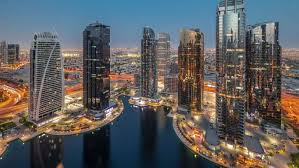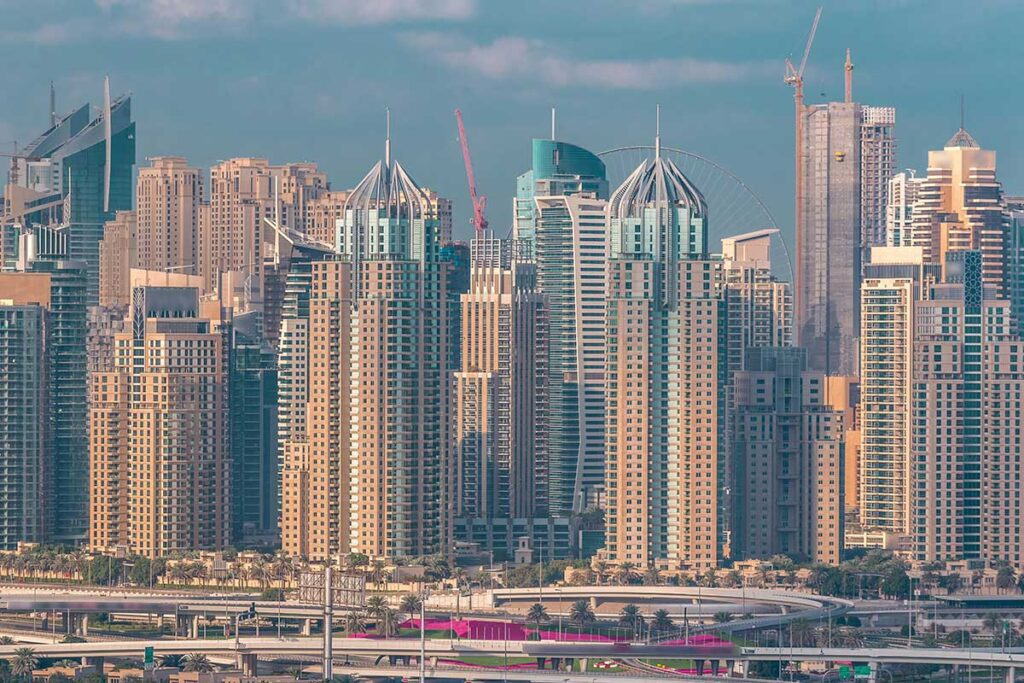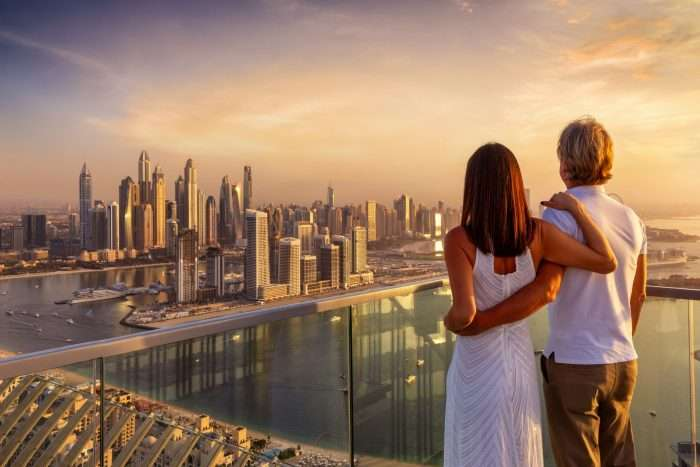
Imagine waking up in a sleek villa, your smart home adjusting the lights as you gaze over a private beach or a lush urban park, knowing your property is part of Dubai’s vibrant future. In 2025, Dubai’s real estate market is thriving, with 96,000 transactions worth $87 billion in the first half, 58% driven by buyers from the UK, India, Russia, and China.
Fueled by 25 million tourists and a 4% population surge, lifestyle trends like smart home integration, sustainable living, wellness-focused communities, and hybrid work-friendly spaces are reshaping properties in areas like Palm Jumeirah, Dubai Hills Estate, and Dubai Creek Harbour.
These trends align with 100% freehold ownership, a dirham pegged to the U.S. dollar, and no personal income tax, capital gains tax, or annual property taxes. With 6-10% rental yields and 7-15% price appreciation, Dubai outperforms London (2-4%) and New York (2-3%). Properties over $545,000 qualify for a 10-year Golden Visa, enhancing appeal. Navigating fees, VAT, and 2025 regulations is key to securing your place in this dynamic landscape.
Smart home technology is transforming Dubai’s real estate, with properties in Dubai Hills Estate and Palm Jumeirah integrating AI-driven systems for lighting, climate, and security. A $600,000 apartment in Dubai Creek Harbour, equipped with smart thermostats and voice-controlled appliances, yields $36,000-$54,000 tax-free annually, saving $13,320-$24,300 versus U.S. (37%) or UK (45%) taxes.
These systems boost rental appeal, increasing yields by 10-15% ($3,600-$8,100) for short-term leases near Dubai Mall, requiring a DTCM license ($408-$816). A $5 million Palm Jumeirah villa with smart features yields $120,000-$150,000, saving $54,000-$67,500. Maintenance costs for tech upgrades ($1,000-$5,000 annually) are offset by 7-15% price growth, driven by demand for connected living. Non-compliance with licensing risks fines up to $13,612, so proper registration is crucial.
Smart homes feel like living in a seamless, futuristic embrace.
Sustainability is a cornerstone of Dubai’s 2025 real estate vision, with projects like Dubai Hills Estate incorporating solar panels, water recycling, and green spaces. A $800,000 villa in Emaar Hillside, with eco-friendly features, yields $48,000-$64,000 tax-free, saving $17,760-$28,800. Selling for $960,000 (20% appreciation) yields a $160,000 tax-free profit, saving $32,000-$44,800 versus London (20-28%) or New York (20-37%).
No property taxes save $8,000-$30,000 yearly, unlike London’s council tax ($16,000-$60,000). Green certifications boost 7-10% price growth, appealing to eco-conscious buyers. Maintenance fees ($8,000-$20,000) cover sustainable amenities, and a 5% municipality fee on rentals ($2,400-$3,200) applies. Off-plan purchases incur 5% VAT on developer fees ($8,000-$60,000), recoverable via FTA registration ($500-$1,000).
Sustainable homes feel like nurturing the planet and your wealth.
Wellness is redefining Dubai’s luxury, with communities like Dubai Hills Estate and Bluewaters Island offering yoga studios, spas, and green trails. A $600,000 Bluewaters apartment near wellness amenities yields $36,000-$54,000 tax-free, saving $13,320-$24,300. Selling for $720,000 yields a $120,000 tax-free profit, saving $24,000-$33,600.
No property taxes save $6,000-$30,000, and VAT exemption saves $30,000. Maintenance fees ($8,000-$20,000) cover wellness facilities, and a 5% municipality fee ($1,800-$2,700) applies. Short-term rentals, boosted by 25 million tourists near Ain Dubai, require DTCM licensing, increasing yields by 10-20% ($3,600-$10,800). Wellness features drive 8-12% price growth, attracting health-conscious families and professionals.
Wellness communities feel like a rejuvenating hug for your lifestyle.
Hybrid work trends are shaping Dubai’s real estate, with properties in Downtown Dubai and Dubai South featuring home offices and co-working spaces. A $500,000 Dubai South apartment with a dedicated workspace yields $30,000-$45,000 tax-free, saving $13,500-$20,250. Selling for $600,000 yields a $100,000 tax-free profit, saving $20,000-$28,000.
No property taxes save $5,000-$15,000, and VAT exemption saves $25,000. Maintenance fees ($5,000-$12,000) cover high-speed internet and communal workspaces, and a 5% municipality fee ($1,500-$2,250) applies. Long-term leases, popular with remote workers near Al Maktoum Airport, need Ejari registration ($54-$136). These spaces drive 7-10% price growth, meeting the needs of Dubai’s growing professional community.
Hybrid homes feel like a perfect balance of work and comfort.
Dubai’s no-income-tax policy lets you keep 100% of rental income, unlike the U.S. (up to 37%) or UK (up to 45%). A $1 million Downtown Dubai penthouse yields $60,000-$80,000, saving $22,200-$36,000. Short-term rentals near Burj Khalifa require a DTCM license, boosting yields by 10-20% ($6,000-$16,000). Long-term leases in family-friendly Dubai Hills need Ejari registration for stability. Non-compliance risks fines up to $13,612, so licensing is key. AI-driven pricing tools optimize returns, especially in high-demand areas, ensuring your investment thrives.
Tax-free rentals feel like a monthly gift to your future.

Zero capital gains tax means you keep all sale profits. Selling a $1 million Emirates Hills villa for $1.2 million (20% appreciation) yields a $200,000 tax-free profit, saving $40,000-$56,000 versus London or New York. A $5 million Palm Jumeirah villa sold for $6.25 million delivers a $1.25 million tax-free gain, saving $250,000-$350,000. Price growth varies: 10-15% in Palm Jumeirah, 7-12% in Dubai Hills and Downtown. A 4% DLD fee ($20,000-$200,000), often split, applies, but tax-free profits make Dubai a wealth-building haven.
Keeping every dirham feels like a financial celebration.
Dubai has no annual property taxes, saving $5,000-$50,000 yearly on $500,000-$5 million properties versus London’s council tax ($10,000-$100,000) or New York’s property tax (1-2%). Maintenance fees ($5,000-$25,000) cover amenities like parks, marinas, or wellness centers, competitive globally. A 5% municipality fee on rentals ($1,500-$7,500) applies, reasonable for premium locations. These costs make ownership sustainable, supporting Dubai’s trendsetting lifestyles.
No property taxes feel like a warm embrace for your investment.
Residential purchases skip 5% VAT, saving $25,000-$250,000 on $500,000-$5 million properties, unlike the UK’s stamp duty (up to 12%, or $60,000-$600,000). Off-plan purchases incur 5% VAT on developer fees ($5,000-$100,000), recoverable via FTA registration ($500-$1,000). Short-term rental operators register for VAT if revenue exceeds $102,041, charging 5% but claiming credits on DTCM fees ($408-$816). A $500,000 apartment yielding $30,000-$45,000 incurs $1,500-$2,250 in VAT, with $600-$1,200 in credits; a $5 million villa yielding $120,000-$150,000 incurs $6,000-$7,500 in VAT, with $2,000-$3,000 in credits. Non-compliance risks fines up to $13,612, so meticulous records are crucial.
VAT exemptions feel like a clever boost to your profits.
The 4% DLD fee, often split, applies: $20,000 for a $500,000 apartment or $200,000 for a $5 million villa. Gift transfers to family reduce DLD to 0.125%, saving $19,375-$193,750. For example, gifting a $5 million villa cuts DLD from $200,000 to $6,250. Title deed issuance costs $136-$272, requiring DLD registration. Broker fees (2%, or $10,000-$100,000) may be waived for off-plan projects. Mortgage registration (0.25% of the loan, or $1,250-$12,500) and valuation fees ($680-$1,360) apply for financed deals. The 2025 Oqood system ensures escrow compliance for off-plan purchases, protecting your investment.
Title deeds feel like the key to your vibrant future.
The 9% corporate tax, introduced in 2023, applies to businesses with profits over $102,110. A company leasing a $500,000 apartment yielding $30,000-$45,000 faces a 9% tax ($2,700-$4,050), reducing net income to $27,300-$40,950. A $5 million villa yielding $120,000-$150,000 incurs $10,800-$13,500 in tax. Qualified Free Zone Person (QFZP) status in DMCC avoids this, saving $3,060-$36,000, with setup costs of $2,000-$5,000. Small business relief waives corporate tax for revenues under $816,000 until December 31, 2026. Individual ownership skips this tax, ideal for most buyers.
Corporate tax feels like a wave you can easily navigate.
The Domestic Minimum Top-up Tax (DMTT), effective January 1, 2025, imposes a 15% tax on multinationals with revenues over €750 million ($793 million). Individual investors are unaffected, and QFZP status avoids DMTT, saving $3,060-$36,000. Cabinet Decision No. 34 exempts Qualifying Investment Funds from corporate tax if real estate income is below 10%. A QIF earning $1 million, with $100,000 from rentals, faces 9% tax ($8,100) on 90% ($900,000). A July 2025 policy allows corporate tax deductions on fair market value depreciation, saving $1,818-$9,000 annually for a $1 million property revalued at $1.25 million.
New rules feel like a puzzle with prosperous solutions.
Atlantis The Royal Residences ($600,000-$5 million) offer villas with 6-9% yields and 10-15% price growth, featuring smart home systems and private beaches. A $600,000 apartment yields $36,000-$54,000 tax-free, saving $13,320-$24,300. Selling for $750,000 yields a $150,000 tax-free profit, saving $30,000-$42,000. No property taxes save $6,000-$50,000, and VAT exemption saves $30,000. Maintenance fees ($8,000-$25,000) cover smart and wellness amenities. QFZP saves $6,120-$36,000. U.S. investors deduct depreciation ($10,909-$90,909), saving up to $31,818.
Atlantis The Royal feels like a coastal tech haven.
Emaar Hillside ($800,000-$3 million) offers villas with 6-8% yields and 7-10% price growth, featuring sustainable designs and wellness parks. An $800,000 villa yields $48,000-$64,000 tax-free, saving $17,760-$28,800. Selling for $960,000 yields a $160,000 tax-free profit, saving $32,000-$44,800. No property taxes save $8,000-$30,000, and VAT exemption saves $40,000. Maintenance fees ($8,000-$20,000) cover green amenities. QFZP saves $6,120-$36,000. U.S. investors deduct depreciation ($14,545-$54,545), saving up to $19,091.
Emaar Hillside feels like a green, nurturing retreat.
Creek Waters ($400,000-$1.2 million) offers apartments with 7-10% yields and 8-12% price growth, featuring smart homes and waterfront views. A $400,000 apartment yields $24,000-$36,000 tax-free, saving $8,880-$16,200. Selling for $480,000 yields a $80,000 tax-free profit, saving $16,000-$22,400. No property taxes save $4,000-$12,000, and VAT exemption saves $20,000. Maintenance fees ($5,000-$10,000) cover smart systems. QFZP saves $3,060-$12,240. U.S. investors deduct depreciation ($7,273-$21,818), saving up to $7,636.
Creek Waters feels like a smart waterfront escape.
Emaar South ($400,000-$1.2 million) offers townhouses with 7-8% yields and 7-10% price growth, featuring hybrid workspaces near Al Maktoum Airport. A $400,000 townhouse yields $24,000-$36,000 tax-free, saving $8,880-$16,200. Selling for $480,000 yields a $80,000 tax-free profit, saving $16,000-$22,400. No property taxes save $4,000-$12,000, and VAT exemption saves $20,000. Maintenance fees ($5,000-$10,000) cover workspaces. QFZP saves $3,060-$12,240. U.S. investors deduct depreciation ($7,273-$21,818), saving up to $7,636.
Emaar South feels like a dynamic work-live hub.
Price Range: Creek Waters and Emaar South ($400,000-$1.2 million) suit mid-range buyers; others ($600,000-$5 million) target premium investors.
Rental Yields: 6-10%, with Creek Waters at 7-10% for short-term rentals (10-20%, $2,400-$13,500); others at 6-8% for stable leases.
Price Appreciation: 7-15%, with Palm Jumeirah at 10-15%, others at 7-12%.
Lifestyle: Smart homes, green spaces, and wellness amenities drive demand.
Amenities: Dubai Mall, Ain Dubai, and parks enhance appeal.
ROI Verdict: 8-12% ROI, blending trends with strong returns.
These trends feel like shaping your vibrant future.

For individuals: Hold properties personally to avoid corporate taxes, saving $3,060-$36,000. Negotiate DLD fee splits, saving $10,000-$100,000. Use gift transfers to reduce DLD to 0.125%, saving $19,375-$193,750. Recover 5% VAT on developer fees via FTA registration ($500-$1,000). Leverage double taxation treaties with 130+ countries, saving $8,880-$67,500. U.S. investors deduct depreciation ($7,273-$90,909), saving up to $31,818. For corporates: Secure QFZP status, keep QIF income below 10%, and claim depreciation deductions. Hire property managers ($5,000-$25,000 annually) and tax professionals ($1,000-$3,000) to avoid fines up to $136,125.
These strategies feel like a roadmap to your trendy wealth.
A projected oversupply of 182,000 units by 2026 may slow price growth in Dubai South, but established areas like Palm Jumeirah remain resilient. Off-plan delays risk setbacks, so choose trusted developers like Emaar and verify escrow compliance via the 2025 Oqood system. Non-compliance with VAT or DTCM rules risks fines up to $13,612, and corporate tax errors can cost $136,125. Indian investors must report properties in India’s Foreign Asset schedule to avoid $135,000 penalties. Currency fluctuations, like a 5% dirham shift, could impact returns.
From smart homes in Creek Waters to wellness havens in Dubai Hills, these trends drive 8-12% ROI, 7-15% growth, and tax-free savings of $4,000-$300,000 annually. With Golden Visa perks and 80-85% rental occupancy, Dubai’s real estate is a trendsetter’s dream. Navigate fees, embrace these trends, and invest in Dubai’s vibrant future in 2025.
read more: Best City and Island Projects in Dubai to Watch in 2025
